Wikipedia community
 | |
| Type | Informal organizationof individual contributors |
|---|---|
| Focus | Free,open-content,wiki-basedInternetencyclopedias |
Area served | Worldwide |
| Services | Authoring andeditingWikipedia |
| Website | wikipedia |
TheWikipedia community,collectively and individually known asWikipedians,is anonline communityof volunteers who create and maintainWikipedia,anonline encyclopedia.Since August 2012, the word "Wikipedian" has been anOxford Dictionaryentry.[1]
Wikipedians may consider themselves part of theWikimedia movement,a global network of volunteer contributors to Wikipedia and other related projects hosted by theWikimedia Foundation.
Demographics
In April 2008, writer and lecturerClay Shirkyand computer scientistMartin Wattenbergestimated the total time spent creating Wikipedia at roughly 100 million hours.[2]As of August 2023, there are approximately 109 million registered user accounts across all language editions, of which around 280,000 are "active" (i.e., made at least one edit in the last thirty days).[3]
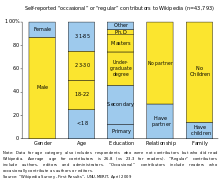
A study published in 2010 found that the contributor base to Wikipedia "was barely 13% women; the average age of a contributor was in the mid-20s".[4]A 2011 study by researchers from theUniversity of Minnesotafound that females comprised 16.1% of the 38,497 editors who started editing Wikipedia during 2009.[5]In a January 2011New York Timesarticle,Noam Cohenobserved that 13% of Wikipedia's contributors are female according to a 2008 Wikimedia Foundation survey.[6]Sue Gardner,a former executive director of the Wikimedia Foundation, hoped to see female contributions increase to 25% by 2015.[6]Linda Basch, president of the National Council for Research on Women, noted the contrast in these Wikipedia editor statistics with the percentage of women currently completing bachelor's degrees, master's degrees and PhD programs in the United States (all at rates of 50% or greater).[7]
In response, various universities have hostededit-a-thonsto encourage more women to participate in the Wikipedia community. In fall 2013, 15 colleges and universities—including Yale, Brown, and Penn State—offered college credit for students to "write feminist thinking" about technology into Wikipedia.[8]A 2008 self-selected survey of the diversity of contributors by highest educational degree indicated that 62% of responding Wikipedia editors had attained either a high school or undergraduate college education.[9]
In August 2014, Wikipedia co-founderJimmy Walessaid in a BBC interview that the Wikimedia Foundation was "... really doubling down our efforts..." to reach 25% of female editors (originally targeted by 2015), since the Foundation had "totally failed" so far. Wales said "a lot of things need to happen... a lot of outreach, a lot of software changes".[10]Andrew Lih,writing inThe New York Times,was quoted byBloomberg Newsin December 2016 as supporting Wales's comments concerning shortfalls in Wikipedia's outreach to female editors. Lih states his concern with the question indicating that: "How can you get people to participate in an [editing] environment that feels unsafe, where identifying yourself as a woman, as a feminist, could open you up to ugly, intimidating behavior".[11]
In October 2023, a representative survey of 1,000 adults in the U.S. byYouGovfound that 7% had ever edited Wikipedia, 20% had considered doing so but had not, 55% had neither considered editing Wikipedia nor done it, and 17% had never visited Wikipedia.[12]
Motivation
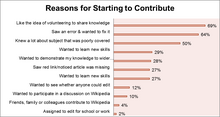

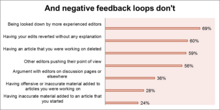
In a 2003 study of Wikipedia as a community, economics Ph.D. student Andrea Ciffolilli argued that the lowtransaction costsof participating inwikisoftware create a catalyst for collaborative development, and that a "creative construction" approach encourages participation.[13]A paper written by Andrea Forte andAmy Bruckmanin 2005, called "Why Do People Write for Wikipedia? Incentives to Contribute to Open-Content Publishing", discussed the possible motivations of Wikipedia contributors. It applied Latour and Woolgar's concept of thecycle of creditto Wikipedia contributors, suggesting that the reason that people write for Wikipedia is to gain recognition within the community.[14]
Oded Nov, in his 2007 paper "What Motivates Wikipedians", related the motivations of volunteers in general to the motivations of people who contribute to Wikipedia.[15]Nov carried out a survey using the six motivations of volunteers, identified in an earlier paper.[16]The six motivations he used were:
- Values – expressing values to do with altruism and helping others
- Social – engaging with friends, taking part in activities viewed favourably by others
- Understanding – expanding knowledge through activities
- Career – gaining work experience and skills
- Protective – e.g., reducing guilt overpersonal privilege
- Enhancement – demonstrating knowledge to others
To these six motivations he also added:
- Ideology – expressing support for what is perceived to be the underlyingideologyof the activity (e.g., the belief thatknowledge should be free)
- Fun – enjoying the activity
The survey found that the most commonly indicated motives were "fun", "ideology", and "values", whereas the least frequently indicated motives were "career", "social", and "protective".[15]
TheWikimedia Foundationhas carried out some surveys of Wikipedia contributors and users. In 2008, the Wikimedia Foundation, alongside the Collaborative Creativity Group atUNU-Merit,launched a survey of readers and editors of Wikipedia.[17]The results of the survey were published two years later on 24 March 2010.[18]The Wikimedia Foundation began a process in 2011 of semi-annual surveys in order to understand Wikipedia editors more and better cater to their needs.[19][20]
"Motivations of Wikipedia Content Contributors", a paper by Heng-Li Yang and Cheng-Yu Lai, hypothesised that, because contributing to Wikipedia is voluntary, an individual's enjoyment of participating would be the highest motivator.[21]This paper suggests that although people might initially start editing Wikipedia out of enjoyment, the most likely motivation for continuing to participate isself-concept-based motivations such as "I like to share knowledge which gives me a sense of personal achievement."[21]
A study in 2014 by Cheng-Yu Lai and Heng-Li Yang explored the reasons why people continue editing Wikipedia content. The study used authors of the English-language version of the site and received 288 valid online survey responses. Their results indicated and confirmed that subjective task value, commitment, andprocedural justiceaffected satisfaction of Wikipedians; and satisfaction influenced an author's continued intention to edit Wikipedia content.[22]
Editors of Wikipedia have given personal testimonials of why they contribute to Wikipedia. A theme of these testimonials is the enjoyment that editors may get from contributing to Wikipedia and being part of the Wikipedia community. Also mentioned is the potential addictive quality of editing Wikipedia.Gina TrapaniofLifehackersaid "it turns out editing an article isn't scary at all. It's easy, surprisingly satisfying and can become obsessively addictive."[23]Jimmy Waleshas also commented on the addictive quality of Wikipedia, saying "The main thing about Wikipedia... is that it's fun and addictive".[24]Wikipedians sometimes award one another "barnstars"for good work. These personalized tokens of appreciation reveal a range of valued work extending beyond" simple editing "to include social support, administrative actions, and types of articulation work. The barnstar phenomenon has been analyzed by researchers seeking to determine what implications it might have for other communities engaged in some collaborations.[25]Since 2012, the Wikipedia page curation interface has included a tab offering editors a "Wikilove" option for giving barnstars and other such awards to other editors "as a reward for carefully curated work".[26]Wikilove has been described as "an immaterial P2P reward mechanism" that substitutes for a formal reputation-valuing system on the site.[27]
Media
Wikipedia has spawned a number of community news publications. An online newsletter,The Signpost,has been published since 10 January 2005.[28]Professional cartoonist Greg Williams created a webcomic calledWikiWorldwhich ran inThe Signpostfrom 2006 to 2008.[29]
A podcast calledWikipedia Weeklywas active from 2006 to 2009,[30][31]while a series of conference calls titled "Not the Wikipedia Weekly" ran from 2008 to 2009.[31]
Socializing
Offline activities are organized by theWikimedia Foundationor the community of Wikipedia.
Wikimania
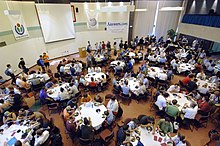
Wikimania is an annual international conference for users of thewikiprojects operated by theWikimedia Foundation(such as Wikipedia and othersister projects). Topics of presentations and discussions include Wikimedia Foundation projects, other wikis,open-source software,free knowledge and free content, and the different social and technical aspects which relate to these topics.
Wiknics
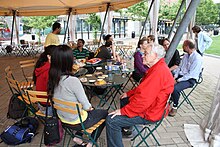
The annual Great American Wiknic was a social gathering that took place in some cities of the United States during the summer. The Wiknic concept allowed Wikipedians to bring picnic food and to personally interact.[32]
There is also a yearlyWikiConference North America.
Criticism
TheSeigenthalerandEssjayincidents caused criticism of Wikipedia's reliability and usefulness as a reference.[33][34][35]Complaints related to the community include the effects of users' anonymity, attitudes towards newcomers, abuse of privileges byadministrators,biases in the social structure of the community (in particulargender biasand lack of female contributors)[36]and the role of the project's co-founderJimmy Walesin the community.[37]One particular controversy with regards to paid contributors to Wikipedia prompted the Wikimedia Foundation to send acease and desistletter to theWiki-PRagency.[38]
Wikipedia's co-founderLarry Sanger(who later founded rival projectCitizendium) characterized the Wikipedia community in 2007 as ineffective and abusive, stating that "The community does not enforce its own rules effectively or consistently. Consequently, administrators and ordinary participants alike are able essentially to act abusively with impunity, which begets a never-ending cycle of abuse."[39]Oliver KammofThe Timesexpressed skepticism toward Wikipedia's reliance onconsensusin forming its content: "Wikipedia seeks not truth but consensus, and like an interminable political meeting the end result will be dominated by the loudest and most persistent voices."[40]
Recognition

AWikipedia Monumentby sculptorMihran Hakobyanwas erected inSłubice,Poland, in 2014 to honor the Wikipedia community.[41]
The2015 Erasmus Prizewas awarded to the Wikipedia community for "[promoting] the dissemination of knowledge through a comprehensive and universally accessible encyclopedia. To achieve that, the initiators of Wikipedia have designed a new and effective democratic platform. The prize specifically recognizes Wikipedia as a community—a shared project that involves tens of thousands of volunteers around the world."[42]
See also
- Wikipedia:Administration– an internal Wikipedia page about the administrative structure of Wikipedia
- Wikipedia:The community– an internal Wikipedia page about the term
- Wikipedia:Meetup– "regular" (or more spontaneous) face-to-face meetings of Wikipedians
- List of Wikipedia people
- Encyclopédistes
References
- ^"Hella ridic new words to make you lolz: ODO August 2012 update".OxfordWords blog.Oxford University Press.23 August 2012. Archived fromthe originalon 28 October 2012.Retrieved27 September2012.
- ^Shirky, Clay(7 May 2008)."Gin, Television, and Social Surplus".World Changing.Archived fromthe originalon 29 December 2015.Retrieved8 June2014.
- ^"List of Wikipedias".Meta-Wiki.Wikimedia Foundation.Archivedfrom the original on 24 August 2023.Retrieved24 August2023.
- ^"Where Are the Women in Wikipedia? – Room for Debate".The New York Times.2 February 2011.Archivedfrom the original on 15 July 2014.Retrieved14 June2014.
- ^Lam, Shyong; Anuradha Uduwage; Zhenhua Dong; Shilad Sen; David R. Musicant; Loren Terveen; John Riedl (3–5 October 2011)."WP:Clubhouse? An Exploration of Wikipedia's Gender Imbalance"(PDF).WikiSym 2011.Archived(PDF)from the original on 29 October 2013.Retrieved28 October2013.
- ^abChom, Noam (30 January 2011)."Define Gender Gap? Look Up Wikipedia's Contributor List".The New York Times.Archivedfrom the original on 18 June 2012.Retrieved9 May2012.
A version of this article appeared in print on January 31, 2011, on page A1 of the New York edition.
- ^Basch, Linda (6 February 2011)."Male-Dominated Web Site Seeking Female Experts"(Letters to the Editor).The New York Times.p. WK–7.Archivedfrom the original on 21 December 2012.Retrieved9 May2012.
- ^"OCAD to 'Storm Wikipedia' this fall".CBC News.27 August 2013.Archivedfrom the original on 26 August 2014.Retrieved21 August2014.
- ^Wikimedia Foundation (April 2009)."WMF Strategic Plan Survey".Archivedfrom the original on 18 November 2016.Retrieved27 December2016.
- ^"Wikipedia 'completely failed' to fix gender imbalance".BBC News.Archivedfrom the original on 29 December 2016.Retrieved9 September2014.
- ^Kessenides, Dimitra; Chafkin, Max (22 December 2016)."Is Wikipedia Woke?".Bloomberg News.Retrieved8 June2022.
- ^"YouGov Survey: Wikipedia"(PDF).YouGov.Retrieved26 January2024.
- ^Ciffolilli, Andrea. "Phantom authority, self-selective recruitment and retention of members in virtual communities: The case of WikipediaArchived8 September 2013 at theWayback Machine",First MondayDecember 2003.
- ^Forte, Amy; Bruckman, Andrea (2005). "Why Do People Write for Wikipedia? Incentives to Contribute to Open-Content Publishing".SIGGROUP 2005 Workshop: Sustaining Community:6–9.CiteSeerX10.1.1.120.7906.
- ^abNov, Oded (2007). "What Motivates Wikipedians?".Communications of the ACM.50(11): 60–64.doi:10.1145/1297797.1297798.S2CID16517355.
- ^Clary, E.; Snyder, M.; Ridge, R.; Copeland, J.; Stukas, A.; Haugen, J. & Miene, P. (1998). "Understanding and assessing the motivations of volunteers: A functional approach".Journal of Personality and Social Psychology.74(6): 1516–1530.doi:10.1037/0022-3514.74.6.1516.PMID9654757.S2CID18946195.
- ^Möller, Erik(3 April 2010)."New Reports from November 2008 Survey Released".Wikimedia Foundation Blog.Wikimedia Foundation.Archivedfrom the original on 17 August 2011.Retrieved11 August2011.
- ^Glott, Ruediger; Schmidt, Phillipp; Ghosh, Rishab."Wikipedia Survey – Overview of Results"(PDF).Wikipedia Study.UNU-MERIT. Archived from the original on 28 July 2011.Retrieved8 December2015.
{{cite web}}:CS1 maint: unfit URL (link) - ^Wikimedia Foundation (10 June 2011)."Wikipedia editors do it for fun: First results of our 2011 editor survey".Wikimedia Foundation Blog.Wikimedia Foundation.Archivedfrom the original on 11 October 2011.Retrieved2 August2011.
- ^Wikimedia Foundation (19 April 2011)."Launching our semi-annual Wikipedia editors survey".Wikimedia Foundation Blog.Wikimedia Foundation.Archivedfrom the original on 7 November 2011.Retrieved2 August2011.
- ^abYang, Heng-Li; Lai, Cheng-Yu (November 2010). "Motivations of Wikipedia content contributors".Computers in Human Behavior.26(6): 1377–1383.doi:10.1016/j.chb.2010.04.011.
- ^Cheng-Yu Lai; Heng-Li Yang (2014). "The reasons why people continue editing Wikipedia content – task value confirmation perspective".Behaviour & Information Technology.33(12): 1371–1382.doi:10.1080/0144929X.2014.929744.S2CID29742930.
- ^Trampani, Gina (28 October 2005)."Geek to Live: How to contribute to Wikipedia".Lifehacker.Gawker Media.Archivedfrom the original on 12 August 2011.Retrieved12 August2011.
- ^Griffin, Ricky W. (2011).Management(10th ed.). Mason, Ohio: South-Western Cengage Learning.ISBN978-1439080993.
- ^T. Kriplean; I. Beschastnikh; et al. (2008)."Articulations of wikiwork".Articulations of wikiwork: uncovering valued work in Wikipedia through barnstars.Proceedings of the ACM. p. 47.doi:10.1145/1460563.1460573.ISBN978-1605580074.
- ^Krista Kennedy,Textual Curation: Authorship, Agency, and Technology in Wikipedia and Chambers Cyclopedia(2016),p. 122.
- ^Primavera De Filippi, "Translating Commons-Based Peer Production Values into Metrics: Toward Commons-Based Cryptocurrencies", in David Lee Kuo Cheun, ed.,Handbook of Digital Currency: Bitcoin, Innovation, Financial Instruments, and Big Data(Elsevier, 2015),p. 469.
- ^Phoebe Ayers; Charles Matthews; Ben Yates (2008).How Wikipedia Works: And how You Can be a Part of it.No Starch Press. p. 345.ISBN978-1593271763.Archivedfrom the original on 10 October 2019.Retrieved1 March2016.
- ^"WIKIWORLD Comics by Greg Williams".Archivedfrom the original on 13 April 2017.Retrieved12 April2017.
- ^"Wikipedia Weekly".Wikipedia Weekly.Archived from the original on 11 May 2017.Retrieved12 April2017.
{{cite web}}:CS1 maint: unfit URL (link) - ^abLih, Andrew (2009)."Adminship".The Wikipedia Revolution: How a Bunch of Nobodies Created the World's Greatest Encyclopedia.Hachette Books.ISBN978-1401395858.Archivedfrom the original on 18 May 2021.Retrieved15 October2020.
- ^Hesse, Monica (25 June 2011)."Wikipedia editors log off long enough to mingle".The Washington Post.Archivedfrom the original on 9 July 2011.Retrieved5 July2011.
- ^John Seigenthaler(29 November 2005)."A false Wikipedia 'biography'".USA Today.Archivedfrom the original on 6 January 2012.Retrieved18 September2017.
- ^Katharine Q. Seelye (3 December 2005)"Snared in the Web of a Wikipedia Liar"Archived7 September 2014 at theWayback MachineThe New York TimesArchived21 February 2020 at theWayback Machine
- ^Cohen, Noam (5 March 2007)."A Contributor to Wikipedia Has His Fictional Side".The New York Times.Archivedfrom the original on 13 October 2007.Retrieved23 February2017.
- ^Cohen, Noam (30 January 2011)."Define Gender Gap? Look Up Wikipedia's Contributor List".New York Times.Archivedfrom the original on 16 May 2013.Retrieved15 August2012.
- ^Cohen, Noam (17 March 2008)."Open-Source Troubles in Wiki World".The New York Times.Archivedfrom the original on 3 December 2016.Retrieved23 February2017.
- ^Chang, Andrea (20 November 2013)."Wikimedia Foundation sends cease and desist letter to Wiki-PR".Los Angeles Times.Archivedfrom the original on 16 October 2018.Retrieved21 February2020.
- ^Bogatin, Donna (25 March 2007)."Can Wikipedia handle the truth?".ZDNet.CBS Interactive.Archivedfrom the original on 22 February 2014.Retrieved23 October2013.
- ^Wisdom? More like dumbness of the crowds | Oliver Kamm – Times Online (archive version 2011-08-14)(Author's own copyArchived5 September 2016 at theWayback Machine)
- ^"Poland to Honor Wikipedia With Monument".ABC News.9 October 2014. Archived fromthe originalon 11 October 2014.Retrieved18 May2017.
- ^"Former Laureates".erasmusprijs.org.Praemium Erasmianum Foundation. Archived fromthe originalon 2 June 2019.Retrieved4 January2017.
External links
- Definition of word "Wikipedian"Archived27 August 2012 at theWayback MachineatOxford English Dictionary
- "Analyzing the Creative Editing Behavior of Wikipedia Editors Through Dynamic Social Network Analysis"
- "Wikimania: Meet the Wikipedians. Those "persnickety," techy types who keep your favorite Internet information website brimming with data."60 Minutes:Morley SaferinterviewingJimmy Wales.First aired on 5 April 2015. Rebroadcast on 26 July 2015.
- Listen to and view site edits by Wikipedians as they occur
